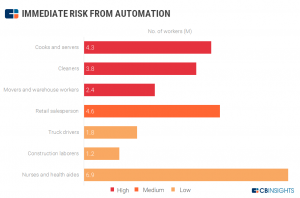Artificial Intelligence, or AI for short, is the broad idea that machines can make decisions and perform tasks without being explicitly programmed to. AI uses machine learning, deep learning, and other techniques to learn how to solve problems beyond its understanding just like a human child. In some ways, AI is very similar to the neurons in the human brain, because it relies heavily on neural networks which are huge interconnected algorithms that process information by responding to different inputs. Since AI is a very new topic in our era, there are many different perspectives on its impact on humanity. Some consider AI a potential threat to humanity that will one day dominate the Earth, while others believe that AI is the savior that will solve most of humanity’s problems.

A drawing of a small neural network. A neural network starts with input or multiple inputs and processes that information until it releases the output or the response. Image taken from a public domain. https://www.shutterstock.com/image-vector/neural-network-graphic-scheme-artificial-intelligence-1583864422
How dangerous is AI?
Many people who dislike AI claim that AI’s knowledge is superior and beyond the human level. Just like a calculator, AI is very good at taking numbers and multiplying or adding them. However, AI itself isn’t too smart, as it lacks the ability to solve problems larger than its scope of intelligence. When AI reaches a problem beyond its scope, it simply produces error messages and fails. On the other hand, when humans reach a difficult problem, they look for other ways to solve the issue. Unlike humans, AI can’t perform complex divergent thinking, at least not yet!
Over the past few years, many jobs have been replaced by automated machines and artificial intelligence. As a result, there have been many concerns about the threat of AI taking over human occupations. Fortunately, unlike many science fiction movies, AI cannot take over human jobs and permanently replace us because humans are inherently needed to create the training data AI is created based on. Additionally, unless the tasks are on an enormous scale, it is much cheaper and more efficient to use humans instead of AI.

In many large companies, jobs are being replaced by AI for the long-term interest of the company. This graph shows the most vulnerable jobs in the US. Photo from CBINSIGHTS https://www.cbinsights.com/research/jobs-automation-artificial-intelligence-risk/
Is AI perfect?
So by now, you might be thinking that AI is perfect. Not at all! AI is used around the world for many important tasks and decision-making processes. Some of these include Amazon’s hiring process, iPhone’s Siri and facial recognition, and Tesla’s self-driving cars. With the advancement of technology, many companies are trying to create their own AI system at a fast pace, which leads to many bugs going through without being fixed. In a worst-case scenario, an AI programmer’s bias could subconsciously affect the algorithms that make up the AI. These algorithmic bugs and biases can create dangerous racial and gender bias during important decisions such as hiring, loan application, and criminal justice, leading to discrimination of certain groups within the society. Such problems can only be solved by humans looking over and supervising the AI.
In Conclusion
Overall, AI is a huge development and it has helped humanity in many ways, but it is also important to acknowledge that AI will never replace humans and our decision-making. At the same time, the concept that AI will one day terminate our world is recognized within the public eye, due to a lack of understanding of how artificial intelligence and algorithms are created and used. Therefore, our goal should be to resolve the issues in artificial intelligence and work towards perfecting the algorithms, so that we can build a better future for all of us!
